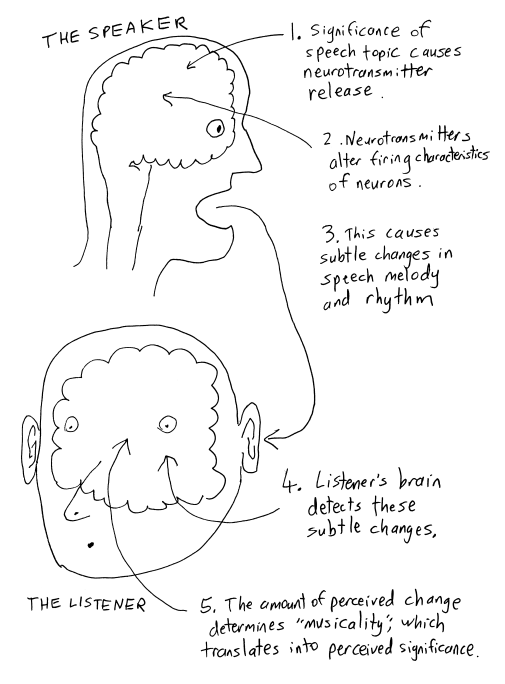Music does something to our perception of the words that are being said as part of the music. Song lyrics have a subjective profundity, meaningfulness and importance. They can seem deeply meaningful even if they are obvious nonsense. We rarely have these kinds of feelings about other spoken words that we hear (i.e. words unaccompanied by music). What is going on?
Two Kinds of Explanation
From a biological point of view, we want to know how this effect on our perception of song lyrics relates to adaptation. There are two major alternatives:
- Our perception of the significance and profundity of song lyrics is not part of an adaptive response.
- Our perception of the significance and profundity of song lyrics is part of an adaptive response.
The first kind of explanation could be called an "accidental" explanation, because it implies that the perception of significance is an accidental side-effect of music perception, and if music perception is an adaptation, it is an adaptation that has nothing directly to do with subjective feelings of significance.
The second kind of explanation could be called a "purposeful" explanation, because it implies that music perception is a part of a perceptual system which has the purpose of determining the significance and profundity of what is being said. In other words, music perception is actually "significance perception".
Because we know that song lyrics aren't really as significant as they seem to be when they are heard in a song, we might conclude that the first kind of explanation is the correct one. But just because the effect of music on our response to lyrics is non-adaptive when listening to music, it doesn't mean that it is not an adaptive response. Because it could be part of an adaptive response to some other circumstance.
For example, it could be part of an adaptive response to normal non-musical speech.
A Possible Mechanism of "Significance Perception"
If music perception is really some kind of "significance perception", what can that possibly have to do with musical features like rhythm and melody?
To help understand how there could be a connection between "significance" and features of music like rhythm and melody, we can consider what might be happening inside the brain of a person who is speaking about something that is really significant to them:
- The high level of significance of the speaker's speech content causes certain neurons in the speaker's brain to transmit neurotransmitters which cause a modal change in other brain regions, in particular, they alter the firing characteristics of neurons over large areas of the cortex.
- This modal alteration helps the brain to process information which is more significant, or more "non-routine".
- The modal alteration alters the firing characteristics of the neurons involved in generating speech, in a manner which subtly alters the rhythm and melody of the speech generated.
- The listener's brain contains a special processing system designed to perceive these subtle changes, and if it detects them, it uses this information to modulate the listener's perception of the significance of what the speaker is saying.
According to this model, the listener's brain is estimating the level of significance that the speaker attributes to their speech content, by applying certain criteria to the characteristics of the rhythm and melody of the speaker's speech.
Within this model of "significance perception", we can explain music as being a super-stimulus, which means that music is a contrived form of speech which satisfies these same criteria in an exaggerated fashion, thus super-stimulating the listener's perception of significance. This is what accounts for the observed subjective effect that music has on a listener's response to song lyrics.
Regularity and Discreteness
What seems to distinguish musical rhythm and melody from normal speech "rhythm" and "melody" are the properties of regularity and discreteness. Musical melody is discrete in that pitch values only have certain values, whereas speech "melody" is largely continuous (with occasional jumps). Musical rhythm is also discrete if we consider which time periods occur between regular beats, which consist of parts of a single note, single notes, parts of a bar and full bars. If we attempt to identify a similar frequency spectrum in speech rhythm, we will find that it is a more continuous spectrum.
The simplest possible explanation of why music has these features is that the criteria for "musicality" (i.e. "perceived significance") are functions of the degree of discreteness in these and other perceived features of speech. The effect of subjective significance on the speaker's brain is to "discretize" various aspects of their speech output by a small but detectable amount, and this is what the music perception system in the listener's brain is responding to. Music exaggerates this discreteness to the maximum extent possible (and to a much greater extent than would ever happen in normal speech) resulting in the maximised perception of "significance" by the listener.
To account for musical features in more detail requires creating mathematical models of how various features of rhythm and melody are perceived by the brain, which is more than what I want to do in this blog entry.
Explanatory Diagram
